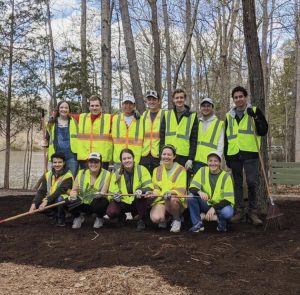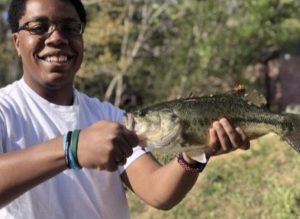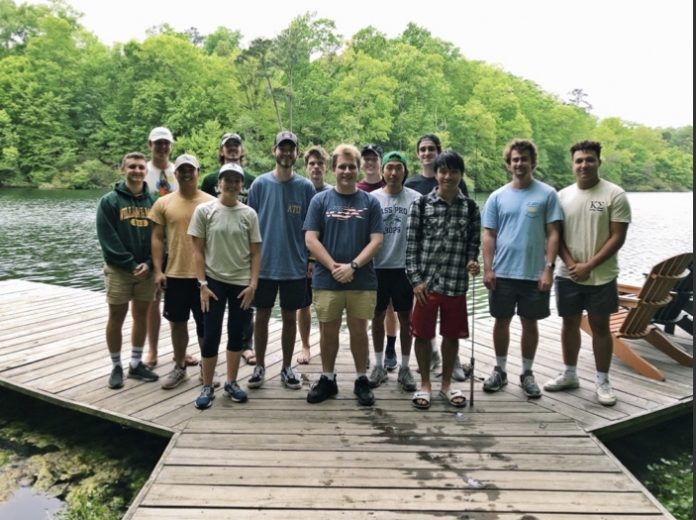Come warmer days and gentler breezes, you will surely find students hanging out at Lake Matoaka, a cherished spot for winding down and finding peace in nature. However, these waters may not be as still as before.
President Xavier Starrs ’24 founded the campus fishing and conservation club Matoaka Bottom Feeders two years ago. Promoting outdoor recreation and sustainability awareness, the Bottom Feeders fill up the lake with activity and, in the process of having fun and exploring, also keep Lake Matoaka cleaner and better maintained for future students.
Starrs said he set out with a simple intention when he founded the club: to create a safe and interactive space for students to gather during the stringent COVID-19 restrictions that defined his freshman year.
“There were no activities, no events,” Starrs said. “So, I turned to my buddy Dudley in ROTC, and I was like, ‘Hey, let’s get people outdoors. Let’s get people engaged in a safe way.’”
The members have five core values: education, conservation, mental health, sustainability and inclusivity. These core values ensure the members both find greater significance in their fishing adventures and give back to their community. Since members do not need to have prior experience to join, Starrs and his executive board members dedicate themselves to imparting their knowledge and skills to novices.
“Education [involves] showing and demonstrating [to] individuals how to fish properly [and] appropriately, and what are the best angling methods that are conducive to the longevity of the fish’s life, whether that’s using barbless hooks or practicing catch-and-release,” Starrs said.
The emphasis on conservation and sustainability is two-fold: first, the members care about Lake Matoaka’s quality of wildlife, second, they adhere to a “leave no trace” policy so future generations can enjoy all the lake offers. Mary Reduzzi ’24, the club’s conservation coordinator, explained how they put these values in practice.
“We don’t want people to think that we’re just a tournament-based group or, you know, that we’re fishing just for sport,” Reduzzi said. “We like to actually get out on the lake, the college woods, places like that, and we like to clean up. We like doing trash cleanups, things like that.”
The organization makes sure to define in its mission and actions that conservation and sustainability go hand-in-hand and that every measure they take counts.
“I think the key distinction between conservation and sustainability is that conservation is focused on protecting what we have … and then sustainability is the training we do with the future generations with fishing in mind,” Reduzzi said. “So you’re using tungsten weights instead of lead because they’re more sustainable and trying to avoid using terminal tackle and other angling methods that use live bait.”

Additionally, Starrs highlighted mental health and how it has been a major issue affecting college students’ performance across the country, so he thought it was imperative to factor that into the club’s culture.
“It’s really restorative to the mind and body to take the time to get out there. You’re not thinking about anything. It’s great that you’re just focused on, you know, either hanging out with your buddies or on the task at hand, which is fishing,” Starrs said.
While fishing can be a solitary activity, the Bottom Feeders promote collaboration, with its over 100 members’ unique skill sets complementing and enriching each other’s knowledge and enthusiasm.
“We’ve had people who’ve never fished before come out. We’ve had people who’ve only saltwater fished, now freshwater fishing. We have fly fishermen now fishing for both on Matoaka,” Reduzzi said. “And it’s really cool to see club members connect with each other and say, ‘Hey, are you going out? Let’s go catfishing together.’ And then that person teaches the other person how to catfish — cause it’s a whole separate entity.”
Starrs agreed with the significance of members coming in with different skills and experience levels.
“In every interest meeting, we go around and introduce ourselves and talk about our fishing experience,” Starrs said. “And, you know, there’s always one person who’s caught a huge fish, and then there’s somebody who’s never even been on the water before but likes the idea of it.”
Instead, what matters to the members of the club, regardless of experience level, is a willingness to learn and appreciate one another’s time and company.
“When I brought the [executive] officers together, my idea was that I wanted them to be teachers — that [they] could be approachable and help,” Starrs said. “It didn’t matter that it was their personal gear that they were giving out to help [others] fish but that we were going to help these individuals connect with nature and find a love for the sport.”
Once people become equipped with the skills to enjoy the activity, they often reap lessons that cannot be taught in a classroom. Member Alexander Raffetto ’25 explained that getting involved in fishing and conservation has helped him hone the importance of promoting sustainable practices.
“It is easy to see how much society has impacted aquatic ecosystems as there are a lot of places where fish just aren’t as abundant as they once were,” Raffetto wrote in an email. “Especially in the Chesapeake Bay, it is a lot harder to find fish. It’s discouraging as a fisherman and as someone who appreciates the outdoors.”

Some of the benefits one gains from being in the club may be unexpected. During a trash clean-up, Raffetto overcame one big obstacle to reach the trash: spiders.
“It was the beginning of the year, and the trees still had their summer foliage, and to get to the trash, we had to take the boats right through the underbrush,” Raffetto wrote. “This was problematic because the branches were full of spiderwebs and large orb weaver spiders. I am afraid of spiders, so it was quite the experience, and I ended up having to face my fears.”
The other major component of the Bottom Feeders is their long-running relationship with the Keck Lab, the organization that oversees Lake Matoaka. On their outings, club members use ArcGIS software to monitor the water quality and collect data on fish species. Their data has proved to be instrumental in understanding the diversity of specimens in the lake and how the ecosystem functions.
“Today, we have logged over 400 unique specimens, and we’re still finding new stuff and reporting that back to [the Keck Lab] for further research, which is really cool because it gives the club an additional purpose,” Starrs said.
Outside the campus, the Bottom Feeders have struck over 30 partnerships with fishing and conservation organizations. In return for discounts on gear, merch and fishing advice, the club spreads the word about the organizations and their work. Toadfish Outfitters was highlighted as a particularly meaningful partnership, which is a 501c non-profit that protects oyster reefs in the Chesapeake Bay.
“It really touches on all the aspects of what fishing should be — their main idea is, you know, you get stuff from fishing that’s personally rewarding, but then you’re also giving it back, and that’s what’s important,” Starrs said.

